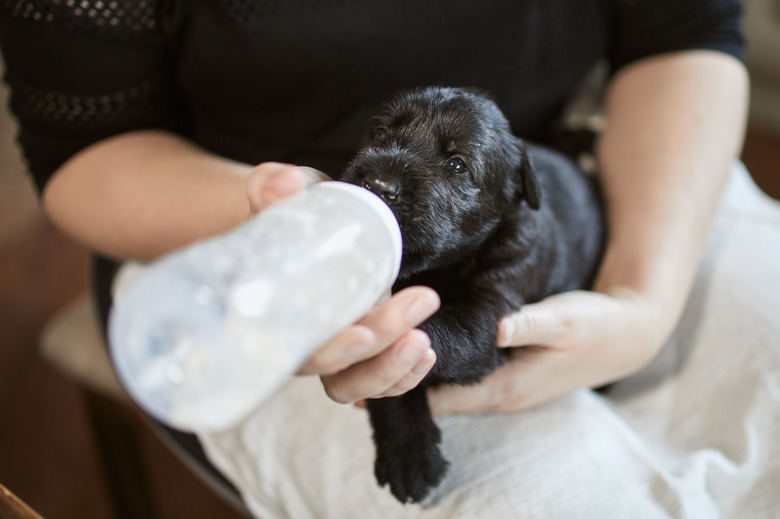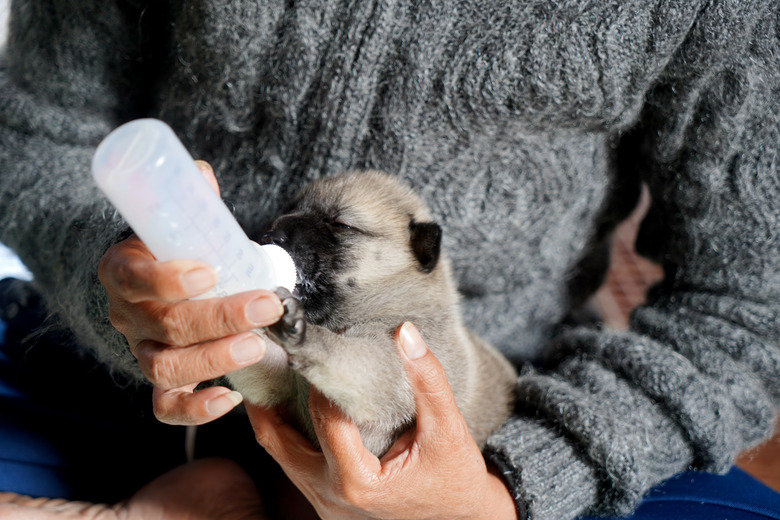Why Is My Puppy Throwing Up? Tips For Bottle Feeding Puppies
Bottle feeding puppies requires a lot of commitment. The mother's milk provides puppies with essential nutrition, and it helps them develop a healthy immune system. However, if a puppy's mother is absent or the mother is having difficulty with feeding, bottle feeding may be necessary.
Puppies can be hand-reared successfully, but it is essential to correctly prepare and feed puppy formula. If you are bottle feeding and notice your puppy throwing up, understanding the possible causes and when to seek veterinary advice is essential.
Why is my puppy throwing up?
Why is my puppy throwing up?
When you see a young dog vomiting during bottle feeding, it is often a sign that something has gone wrong with the feeding technique or formula preparation. If your puppies vomit, monitor them closely. Carefully review your bottle feeding procedures and seek veterinary advice if you're unsure. Puppies can fade and die very quickly if milk gets into their airway.
Bottle feeding your puppy too fast
Accidentally feeding a new puppy too much or too quickly is one of the most common reasons for vomiting. If your puppy throws up during feeding, stop feeding the puppy immediately and give the puppy a break. If the retching continues, take the puppy to the veterinarian.
Some puppies naturally drink too quickly. Try feeding less puppy milk or stop feeding before the puppy is ready for you to stop. Observe how milk flows through the hole in the bottle. If the hole is too big, milk can flow too quickly and cause the puppy to regurgitate.
Puppies with a cleft palate may require tube feeding. Never attempt tube feeding without training and instructions from your veterinarian. Tube feeding incorrectly can quickly kill a puppy.
Your puppy formula is too cold
The temperature of your puppy formula is crucial to healthy feeding. Milk replacer that is too cold can cause vomiting. Before feeding, always warm puppy milk to a temperature of 95 to 100 degrees Fahrenheit. Ensure it is not too warm before feeding, as it can burn your puppy's mouth.
Improperly prepared puppy formula
A young dog throwing up could be caused by the puppy milk replacer not being mixed correctly or if something you used was not properly cleaned. Always mix the formula following the directions on the package to avoid regurgitation. Do not use a blender to mix the formula, as it may become frothy, causing the puppy to become gassy or to vomit.
To prevent hygiene problems, refrigerate any prepared formula and discard it after 24 hours. Thoroughly wash, rinse, and dry the bottles, feeding equipment, and any dishes you used to prepare the formula. This prevents accidental contamination that may cause vomiting.
Other possible causes
Check with your veterinarian to determine if there is some other underlying cause. Other possible reasons that your young puppy who has already been weaned and is eating other food may be throwing up include if they have eaten some table scraps or other human food that they should not have consumed. It could be caused by eating a new food if you switched from a different dog food, or the puppy may be experiencing the onset of food allergies to ingredients that are present in the foods that you are feeding.
Vomiting in puppies may look like undigested food, white foam, or even a clear liquid and may be accompanied by drooling. There are many factors that can cause an upset stomach. Motion sickness in the car, for example, is not an uncommon problem in puppies, and any vomiting will stop when the puppy is no longer traveling.
It is important to remember that vomiting is a potentially serious symptom, so you should never hesitate to consult your veterinarian when you notice that your puppy is vomiting. Life-threatening illnesses that can be a common cause of vomiting in puppies and young dogs include:
- Intestinal parasites: Roundworms, hookworms, whipworms, tapeworms, and Giardia can cause vomiting in puppies.
- Parvovirus: Viral infections such as parvovirus can be life-threatening, so early diagnosis and treatment is essential.
- Pancreatitis: Scavenging, especially foods that are high in fat, can lead to pancreatitis.
- Bloat: Large breeds are more predisposed to bloat,
which can be triggered by food that is too hot, too cold, or too great in
volume as well as by stress or exercising directly before or after a meal. - Ingestion of a foreign body:
If a puppy swallows something they find on the ground or chews off and
swallows part of a dog toy or dog chew, it can get stuck in the esophagus or
gastrointestinal tract. - Gastrointestinal infection: Bacterial infections, viruses, and parasites can all cause gastrointestinal infections in dogs.
- Megaesophagus: This is the most common cause of regurgitation in dogs and is hereditary.
Is it normal for a puppy to throw up?
Puppies being bottle fed a well-prepared and suitable formula and being fed correctly should not vomit.
Puppies who are being bottle fed are very vulnerable. Throwing up can quickly lead to life-threatening dehydration, hypothermia, or hypoglycemia. If your puppy experiences any vomiting or diarrhea, appears less active than usual, does not want to nurse, or is crying, take them to the veterinarian immediately. Even if your puppy has vomited but still seems energetic and wants to eat, consult your veterinarian for guidance.
Milk coming from a puppy's nose
Milk coming from a puppy's nose
If your puppy ever seems unwell after you have noticed milk coming from their nose, contact your veterinarian as a matter of urgency, as it may be a medical emergency. Milk coming from a puppy's nose is often a sign that the puppy is aspirating the milk into their lungs. This can result in aspiration pneumonia, which can quickly become fatal.
Tips for bottle feeding puppies
Tips for bottle feeding puppies
Following tips for successful bottle feeding can help your puppy stay healthy.
- Use a high-quality puppy milk replacer.
- Sanitize all equipment thoroughly between uses.
- Keep formula refrigerated for no more than 24 hours before throwing it away.
- Discard any milk replacer left at room temperature for more than one hour.
- Make sure the puppy formula is the correct temperature before use.
- Check that that nipple opening allows only one drop at a time to pass through it.
- Feed the puppy in a horizontal position (on their belly, not on their back) with their head facing forward as if suckling naturally.
- Give small bottle feeds every two to three hours.
- Record your puppy's weight every other day from birth to ensure they gain about 5% of body weight daily.
- If your bottle feeding puppy appears weak, is crying, is refusing food, or has diarrhea or vomiting, seek veterinary attention.
The bottom line
The bottom line
Bottle feeding can be a rewarding way to help an orphaned puppy, but it is hard work. Hand-rearing a puppy requires good hygiene, properly formulated milk replacer, the proper equipment, and a regular schedule. Neonatal puppies are vulnerable and can become very ill and die quickly if they accidentally aspirate milk. It is always best to seek advice from a DVM when hand-rearing puppies. If your puppy is throwing up, it may be an emergency, so see your veterinarian immediately.


